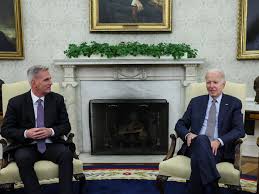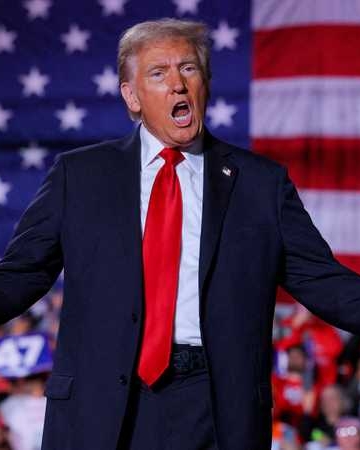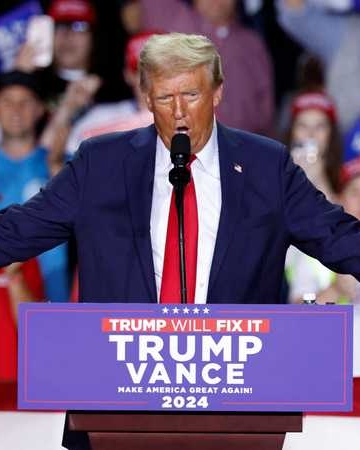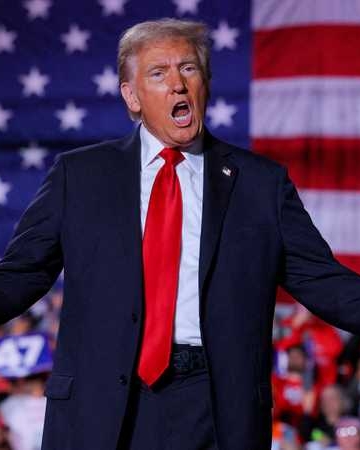US President Joe Biden and House Speaker Kevin McCarthy failed again to reach an agreement to raise the debt ceiling, after another meeting that brought them together yesterday evening, Monday, at the White House.
A week before the deadline to prevent the US government from defaulting – for the first time ever – on its financial obligations, Biden and McCarthy decided to move forward with further discussions.
Biden expressed optimism before and after the meeting, and said – before meeting McCarthy – that he was optimistic about the ability to make progress. After the meeting ended, he said, “It is fruitful and we confirmed once again that default is not on the table, and that the only way forward is the goodwill of both parties towards an agreement.”
For his part, McCarthy said – after the end of the meeting, which lasted about 90 minutes – that it was “better than any other meeting.” “The meeting was productive, and I think tonight’s tone was better than any other time we’ve had discussions,” he added.
McCarthy and Biden held a meeting before the latter traveled a few days ago to participate in the G7 summit in Japan, which he interrupted early and returned to personally supervise the negotiation file on raising the national debt ceiling, and the president did not visit Australia and New Guinea as planned.
Although raising the debt ceiling is usually a routine process, in recent years it has become a point of contention with Republican lawmakers seeking to obtain spending cuts in return for raising the ceiling. According to the New York Times, the ballooning debt is the result of choices made by Republicans and Democrats alike. Since 2000, politicians of both parties have borrowed money to fund wars, tax cuts, expanded federal spending, health care for baby boomers, and emergency measures to help the people survive two debilitating recessions.
It resumed several hours later.
Biden and McCarthy spoke by phone, on Sunday evening, which he described as “productive” talks, which raised the ceiling of expectations about last night’s meeting.
Each party blames the other for not reaching an agreement, and Biden repeated his accusations that the Republicans were responsible for the stalemate, and he said in his press conference in Hiroshima, “It is time for the other side to move away from extremist positions because much of what they have already proposed simply and quite frankly is unacceptable.”
The White House accuses McCarthy of being more interested in catering to the needs of the right wing of the Republican Party than in reaching a consensus on how to cut the deficit and raise the debt ceiling.
On the other hand, the Republicans believe that Biden has fallen captive to the progressive trend of the Democratic Party, which is pushing to increase spending while cutting taxes at the same time. The president said he was ready to cut spending, but stressed that Republicans need to look at increasing tax revenue.
Republican lawmakers largely oppose any tax increase, a key tool that Biden relied on in his proposed budgets to cut the deficit, and McCarthy described the White House as “stepping back” in the talks, adding, “The White House has actually proposed spending billions more, next year, than What are we spending this year?
And last month, Republicans put forward a proposal to suspend the debt limit by $1.5 trillion, or until March 31. In return, they would continue spending on major agencies at 2022 levels during the next fiscal year, and limit growth to 1% annually over the next decade, steps that could result in savings of $4.8 trillion.
The proposal would eliminate key priorities of the Biden administration, such as student loan forgiveness and tax incentives for electric cars.
The White House said the agreement forces “the middle class and working families to bear the burden of tax cuts for the wealthy” and has “no chance” of becoming law.
In response to a question about invoking the 14th Amendment to the Constitution to avoid default, a constitutionally controversial article that no president has resorted to before, and which is demanded by the progressive wing of the Republican Party, Biden said he was not sure if legal challenges to such a move could be resolved. In a timely manner to avoid default.
Some commentators urge the president to bypass Congress by invoking the 14th Amendment to the Constitution, which provides that “the validity of the public debt of the United States shall not be challenged.”
This section was passed after the Civil War to ensure that slave-holding states in the South would pay war debts incurred in the North, and that the government would not be in trouble for compensation to slaveholders and others in the South.
Biden said he was considering it, but using the provision to challenge the debt limit law would almost certainly spark a legal battle, limiting its usefulness in the current crisis.
Treasury Secretary Janet Yellen also downplayed the possibility, saying any attempt to invoke it would spark a constitutional crisis.
Yellen reiterated the president’s position on the amendment, telling NBC that it doesn’t seem like something that can be appropriately used in these circumstances given the legal uncertainty around it, and given the tight time frame that we’re in, “So I hope Congress raises the debt ceiling.”
Source: Al Jazeera



















